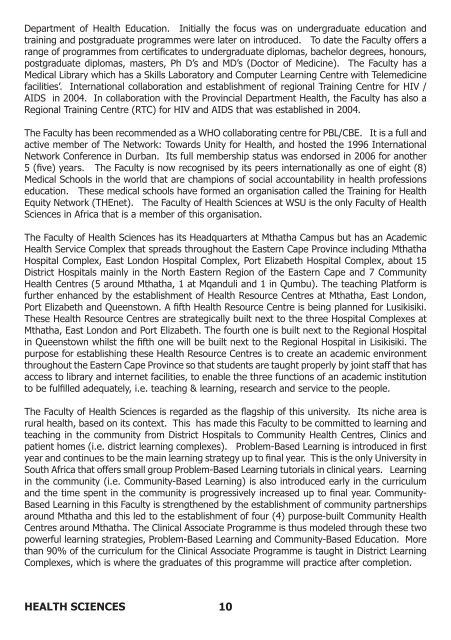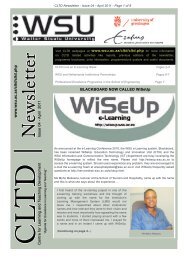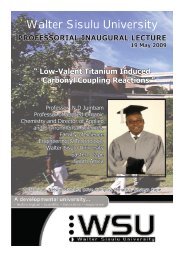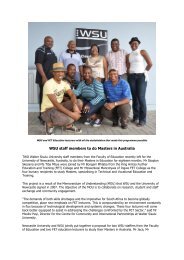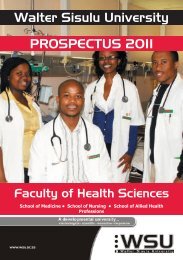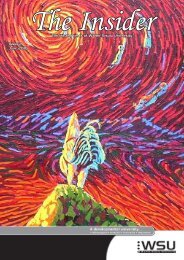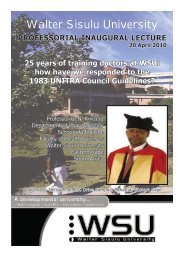Faculty Prospectus 2012 - Walter Sisulu University
Faculty Prospectus 2012 - Walter Sisulu University
Faculty Prospectus 2012 - Walter Sisulu University
You also want an ePaper? Increase the reach of your titles
YUMPU automatically turns print PDFs into web optimized ePapers that Google loves.
Department of Health Education. Initially the focus was on undergraduate education and<br />
training and postgraduate programmes were later on introduced. To date the <strong>Faculty</strong> offers a<br />
range of programmes from certificates to undergraduate diplomas, bachelor degrees, honours,<br />
postgraduate diplomas, masters, Ph D’s and MD’s (Doctor of Medicine). The <strong>Faculty</strong> has a<br />
Medical Library which has a Skills Laboratory and Computer Learning Centre with Telemedicine<br />
facilities’. International collaboration and establishment of regional Training Centre for HIV /<br />
AIDS in 2004. In collaboration with the Provincial Department Health, the <strong>Faculty</strong> has also a<br />
Regional Training Centre (RTC) for HIV and AIDS that was established in 2004.<br />
The <strong>Faculty</strong> has been recommended as a WHO collaborating centre for PBL/CBE. It is a full and<br />
active member of The Network: Towards Unity for Health, and hosted the 1996 International<br />
Network Conference in Durban. Its full membership status was endorsed in 2006 for another<br />
5 (five) years. The <strong>Faculty</strong> is now recognised by its peers internationally as one of eight (8)<br />
Medical Schools in the world that are champions of social accountability in health professions<br />
education. These medical schools have formed an organisation called the Training for Health<br />
Equity Network (THEnet). The <strong>Faculty</strong> of Health Sciences at WSU is the only <strong>Faculty</strong> of Health<br />
Sciences in Africa that is a member of this organisation.<br />
The <strong>Faculty</strong> of Health Sciences has its Headquarters at Mthatha Campus but has an Academic<br />
Health Service Complex that spreads throughout the Eastern Cape Province including Mthatha<br />
Hospital Complex, East London Hospital Complex, Port Elizabeth Hospital Complex, about 15<br />
District Hospitals mainly in the North Eastern Region of the Eastern Cape and 7 Community<br />
Health Centres (5 around Mthatha, 1 at Mqanduli and 1 in Qumbu). The teaching Platform is<br />
further enhanced by the establishment of Health Resource Centres at Mthatha, East London,<br />
Port Elizabeth and Queenstown. A fifth Health Resource Centre is being planned for Lusikisiki.<br />
These Health Resource Centres are strategically built next to the three Hospital Complexes at<br />
Mthatha, East London and Port Elizabeth. The fourth one is built next to the Regional Hospital<br />
in Queenstown whilst the fifth one will be built next to the Regional Hospital in Lisikisiki. The<br />
purpose for establishing these Health Resource Centres is to create an academic environment<br />
throughout the Eastern Cape Province so that students are taught properly by joint staff that has<br />
access to library and internet facilities, to enable the three functions of an academic institution<br />
to be fulfilled adequately, i.e. teaching & learning, research and service to the people.<br />
The <strong>Faculty</strong> of Health Sciences is regarded as the flagship of this university. Its niche area is<br />
rural health, based on its context. This has made this <strong>Faculty</strong> to be committed to learning and<br />
teaching in the community from District Hospitals to Community Health Centres, Clinics and<br />
patient homes (i.e. district learning complexes). Problem-Based Learning is introduced in first<br />
year and continues to be the main learning strategy up to final year. This is the only <strong>University</strong> in<br />
South Africa that offers small group Problem-Based Learning tutorials in clinical years. Learning<br />
in the community (i.e. Community-Based Learning) is also introduced early in the curriculum<br />
and the time spent in the community is progressively increased up to final year. Community-<br />
Based Learning in this <strong>Faculty</strong> is strengthened by the establishment of community partnerships<br />
around Mthatha and this led to the establishment of four (4) purpose-built Community Health<br />
Centres around Mthatha. The Clinical Associate Programme is thus modeled through these two<br />
powerful learning strategies, Problem-Based Learning and Community-Based Education. More<br />
than 90% of the curriculum for the Clinical Associate Programme is taught in District Learning<br />
Complexes, which is where the graduates of this programme will practice after completion.<br />
HEALTH SCIENCES<br />
10


